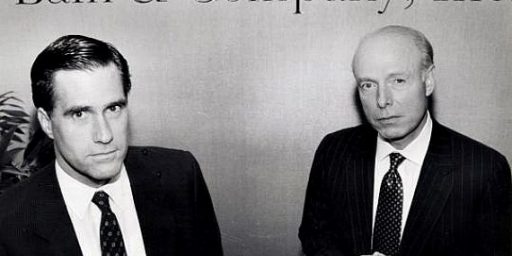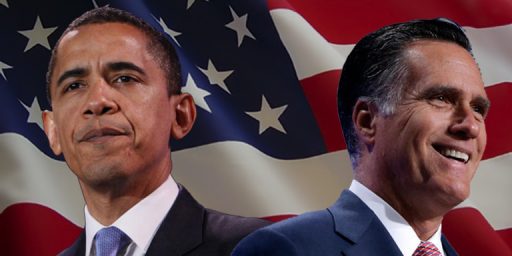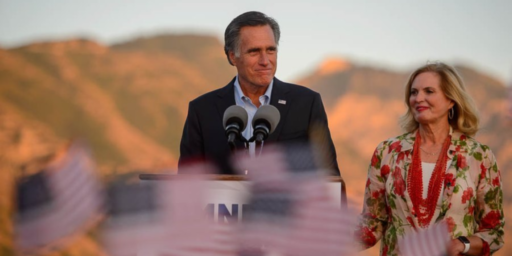More Salvific Politics
Steven L. Taylor
·
Wednesday, January 11, 2012
·
12 comments
Yesterday, I noted how Mrs. Romney asked her husband The Messianic Question.
Given that post, I found the following line from last night’s acceptance speech to be of interest:
Our campaign is about more than replacing a president; it is about saving the soul of America.

About Steven L. Taylor
Steven L. Taylor is a Professor of Political Science and a College of Arts and Sciences Dean. His main areas of expertise include parties, elections, and the institutional design of democracies. His most recent book is the co-authored
A Different Democracy: American Government in a 31-Country Perspective. He earned his Ph.D. from the University of Texas and his BA from the University of California, Irvine. He has been blogging since 2003 (originally at the now defunct Poliblog).
Follow Steven on
Twitter






Is this “messianc” rhetoric really any different that the rhetoric that has been part of American politics from the beginning?
I’m not so sure that is.
@Doug Mataconis: I have made no claims on grounds of uniqueness. Rather, I have noted that a) I don’t like it, and b) it reflects a profound misunderstanding of the role and scope of the presidency.
In this particular case I thought it noteworthy since I have written about the topic yesterday.
@Steven L. Taylor:
I’m not saying you’re wrong at all. I’m just saying that this is a theme that has been part of American politics virtually from the beginning of the Republic. To pick just one example, one need only look at the campaign speeches of a candidate like William Jennings Bryan to find similar themes.
@Doug Mataconis: It does make for an interesting question as to how often and by what type of candidate such claims are made over time.
I have always wondered if people really do believe in these kinds of messages. Every election cycle has been about saving American and what not. But does it still resonate with people as they have before?
Then again, there are many groups of people that believe Obama is the anti-christ, so I guess it’ll just happen for many more years now.
Please find me similar statements in the campaign speeches of any of the following candidates:
John Kerry
Al Gore
George W. Bush
Bob Dole
Bill Clinton
George H.W. Bush
Michael Dukakis
It may not be unique in all of American history, but I have a sense it’s fairly new in recent times. You are free to prove me wrong, however.
@Kylopod: I would hypothesis this much: that the claim is only made by a candidate from an out of power party. As such, I would not expect GHW or Al Gore to have made such statements.
I am not sure I have the will, at the moment, to go searching for examples, however/
>I am not sure I have the will, at the moment, to go searching for examples
Fair enough–but c’mon, you must have some memory of the general tone of those campaigns, and while I’m sure there was plenty of hyperbole to go round, I doubt they went around talking about saving the nation’s soul, or anything comparable.
@Steven L. Taylor: @Kylopod: If you add such things as the evangelical bent toward seeing the elections as the spiritual battle for America writ large and Pat Robertson’s recent “prophecy” regarding God’s message to the nation (that being that Obama is so at odds with majority American values that he will destroy the country and bring “total economic collapse”), Mitt’s statement may go beyond the usual hyperbole to an attempt to reach out to those guys who met in Texas last week to circle the conservative wagons against him. The message of America as exceptional goes back to Plymouth Plantation and the notion of “the city on a hill,” but I think the expectations may be rising. Remember what people imagined that Obama was going to be able to accomplish–and how the right (and the left as far as that goes) has reacted to what little he has accomplished.
Deleted.
@Just nutha ig’rant cracker: That may be a part of it. But what I really think is going on here is what’s been happening to the political climate in just the last few years. Mitt isn’t the only GOP candidate engaging in apocalyptic rhetoric; except for Jon Huntsman and Ron Paul, the whole field sounds like that. It has gone way beyond normal campaign hyperbole and entered the realm of depicting Obama and the Democrats as a literal existential threat to our nation. These candidates may not be quite as explicit about this theme as Alan Keyes was in 2009 when he declared that “we are either going to stop [Obama] or the United States of America is going to cease to exist.” But explicit or not, that’s been the underlying message of the GOP in the last few years.
It is not the evangelicalization of the GOP. That’s been going on since the ’70s. It is the Gingrichization of the GOP. Gingrich has always had a habit of putting everything in stark, apocalyptic terms, and for most of his career, it was merely his own quirk, not shared by most other politicians from either party. Here is a sampling:
1985: Reagan’s decision to meet with Gorbachev represents “the most dangerous summit for the West since Adolf Hitler met with Chamberlain in 1938 at Munich.”
1994: “People like me are what stand between us and Auschwitz.”
1996: “The democracies are in a greater danger than they have been at any time since [British Prime Minister] Stanley Baldwin lied to the English people about the Luftwaffe and Hitler’s Germany.”
2006: “We’re in the early stages of what I would describe as the third World War.”
Basically, the entire GOP has turned into a version of Gingrich. Just look at the very name of the movement that has taken over the GOP: the Tea Party. Think of the historical event it references. It suggests that it does not view itself simply as a reform movement, but as a revolutionary one that considers the current government to be akin to the British before the American Revolution, an illegitimate occupying power. Some Tea Partiers may think of the name as nothing more than an overblown analogy meant to provoke, but the leaders of the movement have been far from clear about this, and it is reflected heavily in the rhetoric of the presidential field.
If someone in the 1990s had told you that in 2012 Gingrich would run for president but that the candidate who compared the Democratic president to King George III and said “We are only inches away from ceasing to be a free-market economy” wouldn’t be Gingrich but the man designated as the “moderate” of the field, you’d think it was some kind of bad joke. But that’s exactly what’s happened. Anyone who suggests this sort of rhetoric is the normal course of politics hasn’t been paying attention.
@Kylopod:
I could not resist. I just HAD to click the “Helpful” button. Too good to pass up.